Many politicians aren’t open to the idea of allowing 16 year olds the right to vote. Yet for many 16 and 17 year old students it’s a great idea and gives them a voice in politics.
While we aren’t official classed as adults until aged 18 I find it strange that the UK age of consent for sexual relationships is 16, meaning we can have sex and create human life yet are unable to cast vote in the democracy that we live in.
Young people shouldn’t be put off by politics. I think having the chance to vote at 16 would encourage many young people to be involved in politics and the things that affect them such as tuition fees, student debt, climate change, rail fares, new laws, the economics of the country, beer prices and our beloved NHS.
Lots of people have concerns about
lowering the voting age, they say how can 16 year old teenagers have enough
life experience to make a decision on government manifesto and proposals. This
real issue is politicians fail to realise we care about things and aren’t
represented or given a say on things that impact the country and our lives. Lowering
the voting age to 16 is a positive step to engage the younger generation and spark
their interest in politics.
If you don’t get a vote then things are
taken out of our hands, which leads to disillusionment, disappointment and
disenchantment because we don’t feel listened and our opinions ignored.
Reducing the voting age will help attract and engage young disenfranchised
voters.
All 16 and 17 year olds views weren’t even considered in the Brexit Vote, which was crazy since it will impact young people’s future the most. As the Brexit Battle was fought out most students had to sit and watch the campaigns and fallout of the aftermath. Not getting a chance to vote on Brexit was the worst thing that politicians could have done to undermine the youth voice because it will be us that face the deepest consequences of leaving the European Union.
When problems affect the Millennial and Generation
Z why shouldn’t we be able to have some input, why don’t politicians what to
empower us to lead change for the future? Aren’t we important enough to be
heard? Maybe 18 to 24 year-olds have a lack of interest in politics and the lowest
voter turnout of any demographic because we aren’t listened to or given rights
to express a political viewpoint.
Young people need to discuss politics in a friendly and informal manner and although very young adolescents may not worry about taxes or the economy and seem uninterested in the outcome you can’t deny that politics affects their lives, family and the whole world. I want you to exchange views with others and most importantly register to vote then cast your vote.
A-level and university students are
given the opportunity to debate social issues
in lessons and lectures so why prevent them a vote. Isn’t education
about enhancing peoples knowledge, preparing them for life and opening
opportunity.
The argument about whether voting at 16
should be possible is about giving the teenagers right to take part in
democracy and discussing what matters most to the young generation.
The truth is we care and dismissing our ideas,
hopes and what we care about shouldn’t be dismissed the in political arena. Many
government policies focus and affect our further education. If the voice of the
youth isn’t been heard then it’s time to take a stand.
Having a chance to vote will let students take ownership and make decisions that shape our futures. By legislating for us to vote we can have a voice and give us the rights to be taken seriously.
We are all doing politics of some nature, whether at home with our parents, at school and working with the boss we are trapped by the rules and laws that govern us. I encourage 16 and 17 year olds to get involved, we all need to do politics or politics will do us over in the next general election.
Don’t be apathetic or think your vote doesn’t count. I believe that the voting age needs to be debated again. I know some have stereotypes about us students and if you consider our age group to be too immature to vote then “your mom”, you grumpy Boaty Mcboatface.
If on the other hand you believe that 16 and 17 years should have the right to vote and the law needs to change than please comment and share this article with the social media buttons below.





